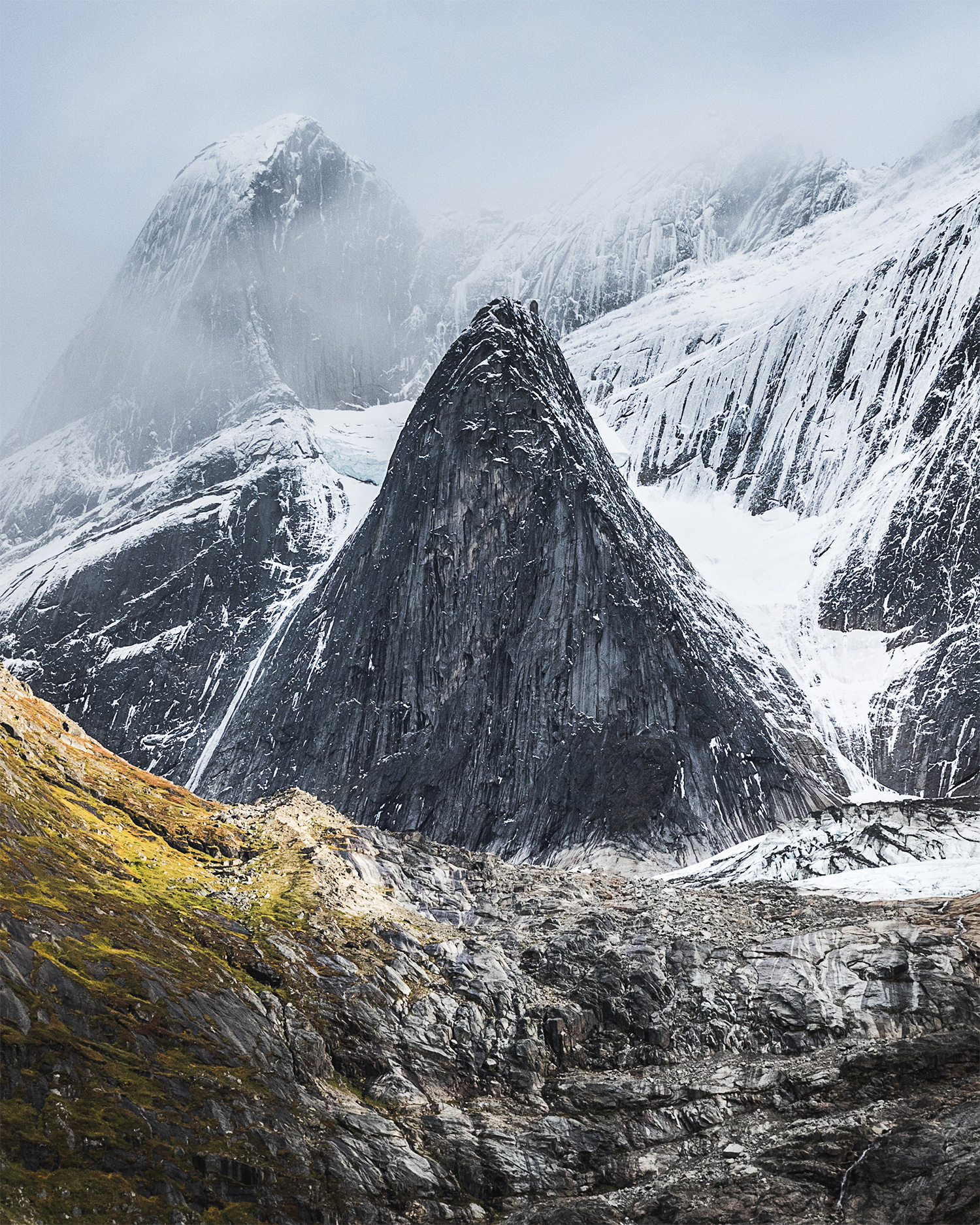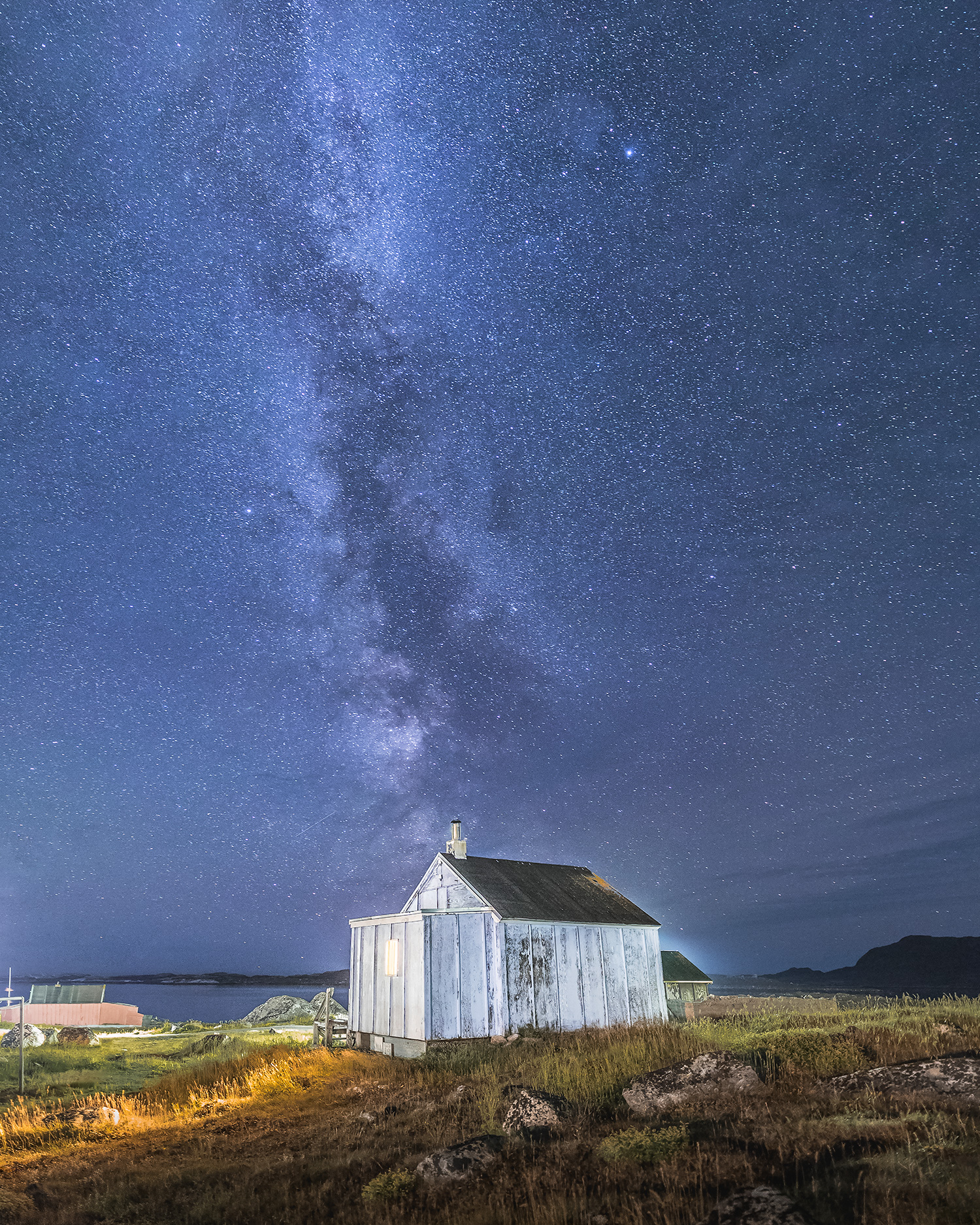Two bearded sailors from Russia entered the lobby of the hotel as I took one last glance on my smartphone.
It was 11.45 a.m., my WiFi signal was about to drop to zero, and it felt strangely liberating to know that my digital self would cease to exist for the next ten days.
The vast and unspoiled waters of South Greenland’s fjords were waiting for us, placid and peaceful under the Arctic sun. All that would connect us to the world ashore was a satellite phone on board of our yacht, which reminded me of the clunky walkie-talkies I used to play with as an ’80s kid. I hoped this one would turn out to be more reliable if we needed it.
It would turn out to be some of the most fulfilling and memorable days of my life.
As I look back on our photography expedition in these remote corners of the world, more than two years later, I realize why its sights and sounds have stuck with me so vividly. For the entire duration of our voyage, there was nothing else competing for our attention. It was just us. And nature.

Freed from the pings and distractions of modern life, we felt a calmness wash over us as soon as we embarked on our journey. For once, our senses were fully attuned to the world around us, instead of being drawn to the devices in our pockets.
It was like we were plunged into a pre-tech world of times long gone; from the minute we awoke, not knowing what time it was or where our skipper had thrown out his anchor after a night of sailing, to the moment we crashed in our cabins, many hours later, blissfully exhausted from a long day of hiking. No distractions. Pure presence.
It was the kind of life we used to live. Looking up at the stars, not down on our screens. In touch with ourselves and our physical surroundings. But then technology started pervading every minute of the day, and we got so enamored with the convenience of constant connectivity that we stopped asking what we may be losing along the way.
There is an app for everything now – except for the ability to feel what it means to be alive and present in the world.
Only by temporarily disconnecting from digital technology do we get the chance to fully reconnect with ourselves and the world around us. Yet these moments of disconnection have become increasingly rare. And, sadly, they have become even rarer during the COVID-19 pandemic.
Unable to roam about freely, we have further retreated from the physical into the virtual realm, our interactions with the world largely reduced to an endless exchange of bits and bytes. The physical and mental toll is now being felt by many, including myself. It’s as if nature is holding up a mirror to us, forcing us to examine our troubled relationship with technology. Deprived of the ability to touch, feel, and soak up the smell of life, we are left with a deep desire to break free from the virtual matrix that is holding us hostage. We want to feel alive again.
But if there’s a silver lining to the virtual imprisonment we have all been subjected to over the past year, it is that we may come to appreciate the restorative power of disconnection even more.

A world without WiFi
In my mind I often sail back to Greenland. It gives me comfort and inspiration to know that there is another world out there. A world defined by a lack of connectivity rather than its ubiquitousness. A world without WiFi in which it takes hours to sail from one village to the next – because there are no roads connecting them.
I remember one morning in particular, halfway our expedition. During the night our yacht had moored at Aappilattoq, a settlement with 150 inhabitants, named after the mountain rising high above its colorful houses. I was the first of our group to wake up, and without looking on my watch or smartphone, as I normally would, I ventured out into the little village as it awoke from its slumber, with the first rays of sunlight revealing what time it was.
I was greeted with a curious smile by a bunch of fishermen who were about to embark on their daily duties, getting their nets ready to catch fresh tuna and halibut. In the streets, a little boy had great fun kicking a ball with his granddad, and I couldn’t resist joining them for a minute. As I continued my morning stroll, with the sun now lighting up most of the mountain, I stumbled upon the local graveyard, and thought of all the generations that had shared this same little world since Aappilattoq was founded in 1805.
(Text continues under photos)



I can still feel the tranquillity of that morning. And I can still recall every little detail of that village. The color of the local supermarket. The pristine smell of the mountain air. The sound of water gently rocking the fishermen’s boats.
Even in as short a time as a week, breaking free from all digital connectivity changes your relationship to time, space, and people in fundamental ways.
Perhaps most importantly, it alters your relationship to yourself.
You rediscover the joy of waking up in the morning and setting your own course for the day with an empty and unspoiled mind, oblivious to the latest breaking news or social media outrage.
You come to appreciate just how often we try to escape even the slightest hint of boredom or anxiety by engaging in seemingly harmless distractions on our digital devices, trading a life of creation and meaning for a life of mindless consumption.
And you come to realize how the most fulfilling destinations in life are the ones that are the hardest to reach, rather than the ones that are instantly accessible at our fingertips.


Reclaiming disconnection in your life
The calm and peaceful village of Aappilattoq may be far removed from the hustle and bustle of modern (virtual) life. But I am convinced we can all reclaim some of the benefits of disconnection in our lives, even if it’s just for an hour or a few minutes.
Why not start your day with all your devices switched off for at least the first 60 minutes? If your experience is anything like mine, you’ll become much more intentional about how you spend your time throughout the day.
Casting a quick glance on your new messages or emails may seem harmless enough, but it immediately puts you in a reactive mindset. Instead, start your morning with an analog activity such as reading a book or perhaps doing a short meditation.
Once you’ve got the hang of it, you’ll may even want to go a full day without connectivity. Introduce an internet-free Saturday or Sunday. Go out for a long hike in nature without any connected devices. Leave your phone at home. Print a map. You may get lost. But that’s the thrill of it.
In his book “The Stress Solution”, the well-known British doctor and health expert Dr. Rangan Chatterjee writes: “Nature is expansive and forces us to look outwards, while technology encourages us to gaze inwards.” He couldn’t be more right.
Lately some people have been asking me why I don’t show up on social media as often as I used to. It’s because, quite frankly, I’d grown increasingly tired of being ‘always on’, and I realized it’s not the life I wanted to live.
Ever since that realization sank in, I’ve been searching for my own inner Greenland – a calmer, quieter place, away from the noise of the modern world. To be honest, I haven’t quite found it yet. But I know it’s waiting there for me, somewhere, because I’ve been there before. And once you’ve experienced it, you’ll never want to be anywhere else anymore.

Subscribe to receive new stories like this in your mailbox
Reflections on life, art, and creativity – inspired and supported by photography.
I care about your privacy. You can unsubscribe at any time.
6 Comments
Add comment Cancel reply
This site uses Akismet to reduce spam. Learn how your comment data is processed.
Mooi! Ik heb sinds kort alle bliepjes en visuele meldingen uitgezet van mijn social media, dat scheelt al heel veel momenten online. Ik check nu als ik daar tijd voor heb in plaats van constant reageren op geluiden en rode bolletjes.
Je foto’s bij dit verhaal zijn ook weer adembenemend.
A wise decision!
Mooi en inspirerend verhaal Tristan! En jeetje, die foto’s!! Prachtig!
Thanks, Ruud!
Wat een cadeautje om opeens Groenland foto’s te mogen bekijken en een mooi geschreven verhaal te lezen ipv werk-gerelateerde teksten. Precies wat ik nodig had! Maakt wel dat ik Alaska en de Yukon nu nog extra mis. Komt vast ooit goed. Prachtig, as always!
Alaska and Yukon will be waiting for you!